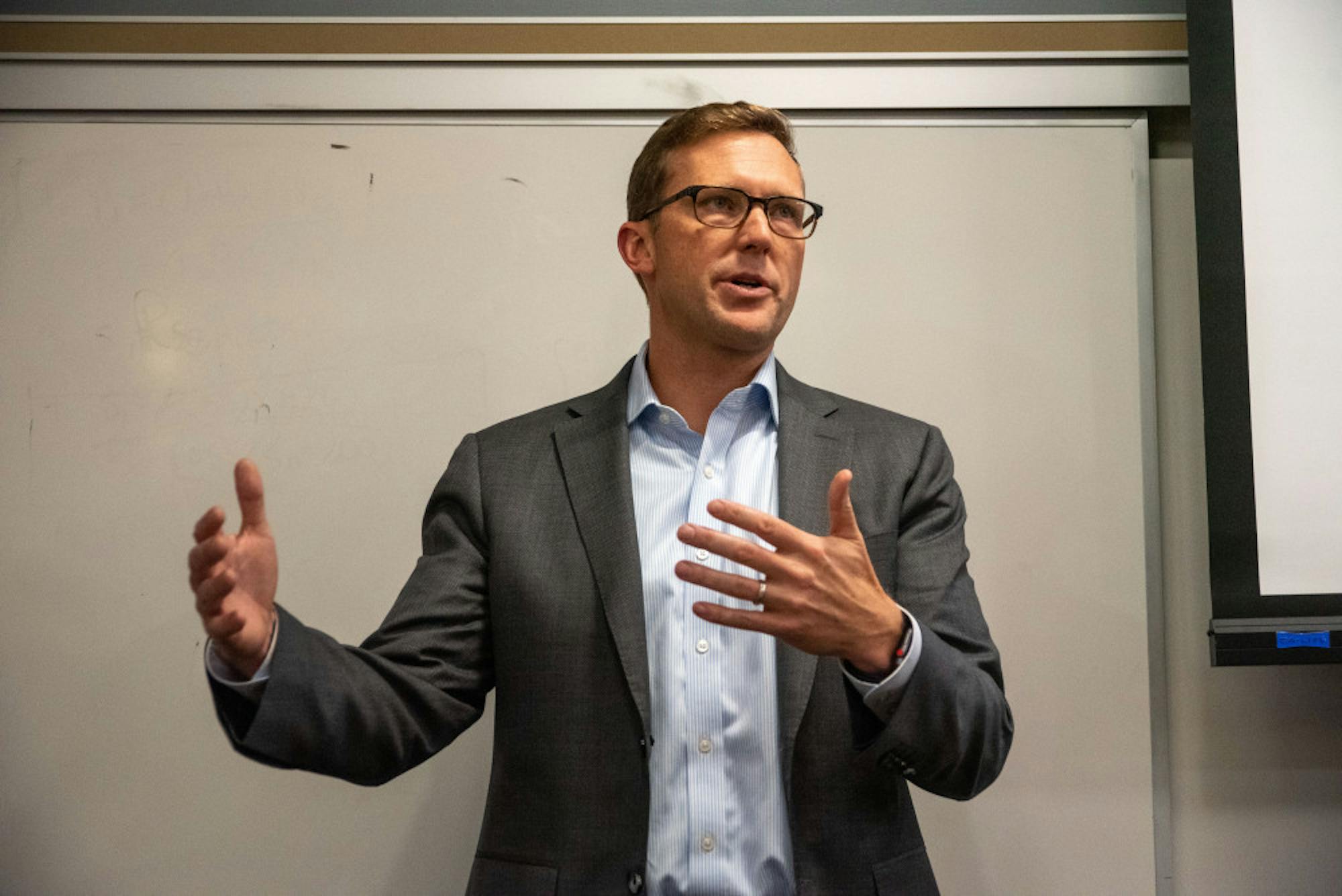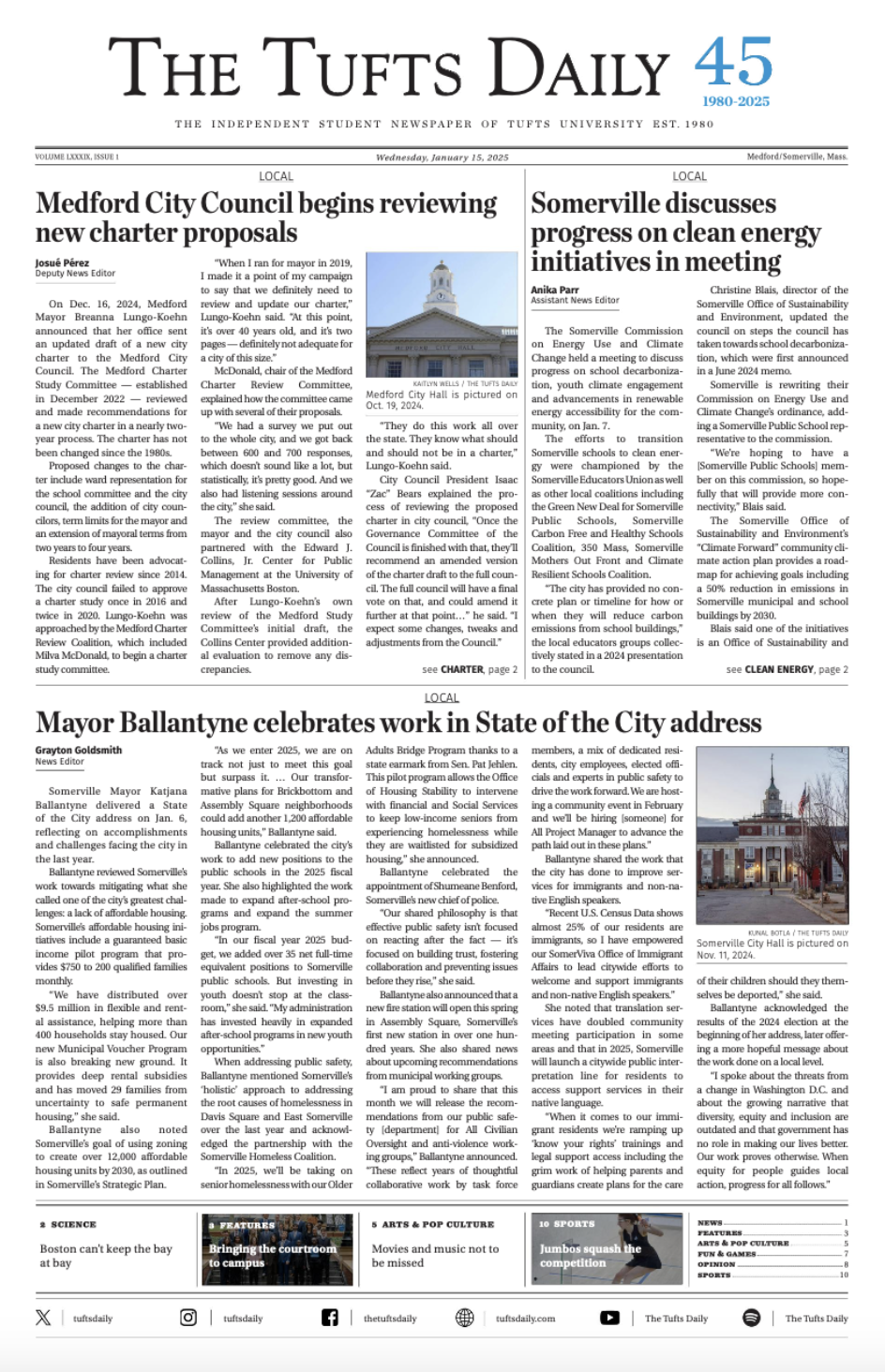Alumni Michael Ewald (LA'94) and John Wright (LA'99) from Bain Capital came to Tufts yesterday for a discussion on their careers at the invitation of Tufts Financial Group. They discussed Bain Capital’s business model and practices along with their roles in the organization. They are two of the 130 directors and partners in the organization.
Bain Capital is a private investment firm founded in 1984 and headquartered in Boston. Today, it has platforms across the continental U.S., Europe, Asia and Australia, with over $305 billion assets under management. With over 1,000 employees and servicing some of the biggest household names, it ranks seventh in the largest private alternative asset manager.
Ewald knew he wanted to go into investments and finances during his time at Tufts. Luckily for him, investment banking was, according to Ewald, gaining popularity at the time of his graduation. He started out at Credit Suisse where he was a consultant.
“At the time, it was a very steep learning curve where I had to learn a lot ... but at the end of the day consulting is interesting, but you are not necessarily making any decisions. So, I wanted the decision-making ability and the feedback loop of ‘Did it work?’” Ewald said.
Ewald started out at Bain Capital in 1998 when, according to him, there were as few as 75 employees. Ewald remembered how then-CEO Mitt Romney led Monday morning meetings every day. Ewald has been at Bain Capital ever since.
Wright likewise knew he wanted to enter finance and investments when he graduated in 1999.
He started in the operations and finance group of Bain Capital before slowly moving into investment credit. He credits Tufts as being “an integral part of my beginnings of my career.”
To a nearly full house in room 206 of the Cabot Intercultural Center, Ewald began the lecture by describing Bain Capital as an alternative asset manager. He emphasized that they are a private company, meaning they are purely serving their investors and themselves. Bain Capital branched out into a venture business, public equity, credit, public equity, real estate, double impact, life sciences, partnership opportunities and tech opportunities.
“We have a whole lot of alternative assets not just in private equity, not just in assets,” Ewald said.
Wright then took over and discussed some of the key aspects of Bain Capital.
“We’ve always taken an approach with the heritage of coming from a consulting firm that you are going to overstaff problems,” he said.
Unlike most of their competitors, Bain Capital remains private. Wright said how this allows them to make their own initiatives and focus on their own capital and external investors.
Wright then discussed how Bain Capital has $41 billion across the spectrum of high-yield credit. Eight billion dollars are in “Distressed and Special Situations” which involves companies going through major restructuring or another opportunistic approach in a special situation. Another $8 billion is in private credit, which is generally with smaller companies. Ten billion dollars are in structured credit which is predominantly found in collateralized loan obligations (CLOs). The remaining $15 billion is in liquid credit which can be in open ended funds or single investors funds which allows them to invest and lend money.
Wright primarily works with companies that are more likely to be household names, saying he pools “anywhere from 150 to 400 and be diverse by company, diverse by company, but generally speaking all of these companies are below investment grade.” This allows a greater yield to Bain Capital as a lower investment grade would allow a greater charge to the company.
“It’s not necessarily a statement about the reliability of the business," Wright said. “It might just be a statement about how levered that business actually is.”
This allows Bain Capital to receive a very senior tranche of debt and minimize any losses due to defaulting on loans.
“Generally speaking, the equity of CLOs has generated returns that are competitive with other equity products, although they can trade in a pretty volatile fashion,” he said.
TFG invites alumni to speak on experiences in Bain Capital

John Wright (LA'99), managing director at Bain Capital, discusses his experience in the finance industry at an event organized by the Tufts Financial Group on Oct. 29.





